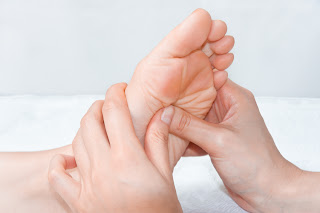Podiatrist's encounter many foot problems during and after pregnancy. From cramps and itchiness to swelling and aching, our feet can often feel very uncomfortable throughout pregnancy and following the birth.
Muscles and ligaments stretch and soften because of an increase in the ovarian hormone relaxin, which makes your feet more prone to ankle and ligament strains on a daily basis.
The choice of footwear can also be a factor in the cause of foot problems during pregnancy.
Wide fitting and supportive shoes will minimise discomfort and help to avoid long term damage. Choosing a shoe with a strap can help the shoe to stay in place although fiddly straps can sometimes cause problems in later stages of the pregnancy when you may struggle to reach your feet. If high heels are a must they should only be worn occasionally or when you know you will be able to sit down through the day. On a daily basis, a supportive shoe should be worn.
When shopping for shoes try to shop later in the day as feet can swell throughout the day. Ensure that the shoes fit well before you leave the shop as it is a common myth that you can break in a pair of shoes - this is not true. Shoes with a round or square toe are recommended. If you are buying boots, make sure that there is room in the calf area as they calves can swell.
Choose a boot with a side zip fastening as they will be easier to take on and off - this will be much more appreciated towards the end of your pregnancy! Keeping active is also recommended to help reduce the risk of cramps and swelling.
Hormonal changes and natural weight gain have a huge impact on the body and the feet bear the brunt of the major changes that a woman's body will go through. Swollen feet, swollen ankles and arch and heel pain are the main causes of foot pain in pregnant women.
Muscles and ligaments stretch and soften because of an increase in the ovarian hormone relaxin, which makes your feet more prone to ankle and ligament strains on a daily basis.
The choice of footwear can also be a factor in the cause of foot problems during pregnancy.
A shoe with a heel of approximately 1.2in (3cm) is recommended as they will help to shift the weight further forward on the feet. This can help to reduce any pain or discomfort.
Wide fitting and supportive shoes will minimise discomfort and help to avoid long term damage. Choosing a shoe with a strap can help the shoe to stay in place although fiddly straps can sometimes cause problems in later stages of the pregnancy when you may struggle to reach your feet. If high heels are a must they should only be worn occasionally or when you know you will be able to sit down through the day. On a daily basis, a supportive shoe should be worn.When shopping for shoes try to shop later in the day as feet can swell throughout the day. Ensure that the shoes fit well before you leave the shop as it is a common myth that you can break in a pair of shoes - this is not true. Shoes with a round or square toe are recommended. If you are buying boots, make sure that there is room in the calf area as they calves can swell.
Choose a boot with a side zip fastening as they will be easier to take on and off - this will be much more appreciated towards the end of your pregnancy! Keeping active is also recommended to help reduce the risk of cramps and swelling.








